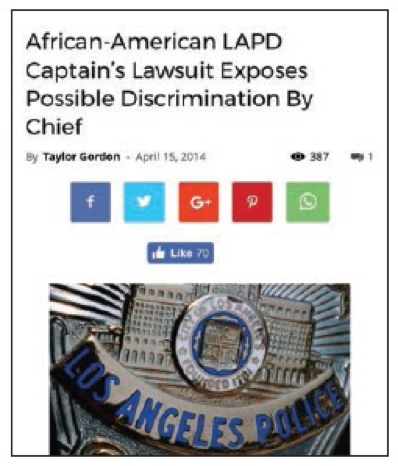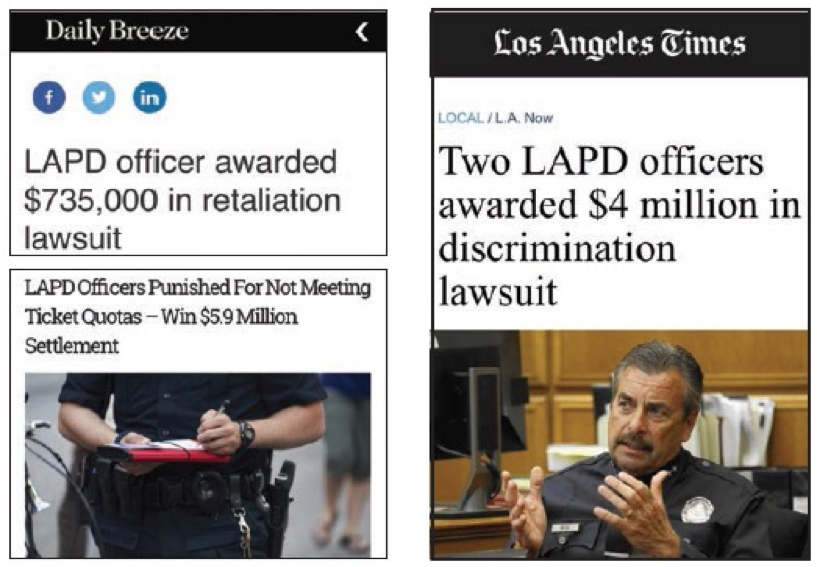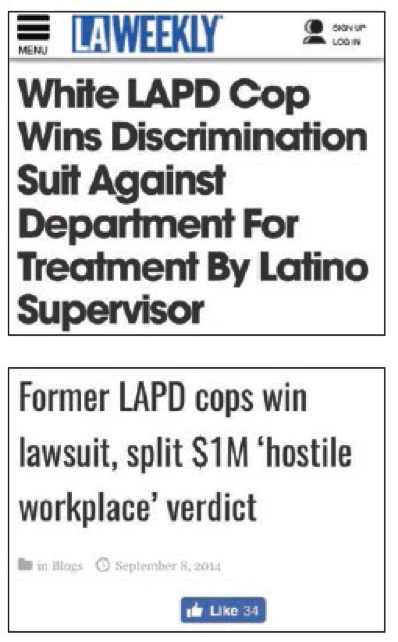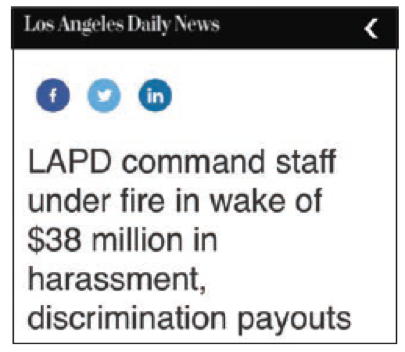Title
Bleeding Blue - June 2017

Body
The Risk Management Star Chamber
Anyone pursuing a career in law enforcement will quickly become familiar with the name “risk management.” Policing involves inherent risks—confronting aggressive and violent criminals, the protection of those who may not be able to protect themselves, and the list goes on. What is not pushed to the forefront is the idea of internal risk. Or rather, the risk faced by the officer or lower-level employee from the top of the organization. Without exception, we accept the physical dangers of the job, but it is difficult to understand that the biggest risk to your career comes from inside the organization.

Welcome to the Risk Management Division, whose mission it is “to reduce physical, financial and organizational harms associated with employee-involved traffic collisions, uses of force, workplace conflict and worker injuries by developing focused and specific harm reduction
interventions for implementation. Harm reduction is achieved by focusing on operational and tactical problem solving, applying interventions, enabling robust data analysis and implementing
structural change where necessary. This strategy is tailored to unique challenges, complexities and strengths, focusing on ‘harms rather than risks.’”
A part of the Risk Management Division is the Risk Management Executive Committee (RMEC), which “is responsible for reviewing employees’ performance to assess risk management concerns and making recommendations to the Chief of Police for corrective, non-disciplinary steps to address any performance, behavioral or other managerial concern.” This
committee meets every month, evaluates a potentially “risky” employee, then decides what this individual may or may not do in the performance of his job, which does include duty restrictions.
If you are “lucky” enough to become the focus of the REMC, the criteria of how you are chosen is a bit fuzzy. Essentially, any command officer may decide an employee is deserving of additional scrutiny. Depending on that command officer’s rank, it is not required that anyone else review or weigh in on this decision. And what recourse does the employee have? None. They are put into a process reminiscent of the Star Chamber, in which those in power don’t like an outcome so they create their own judicial process. And officers who are identified as creating arbitrary risk to the Department are thrust into this system. But what happens later when this command officer’s decision was determined to be malicious or arbitrary? Well, it creates the “risk” that the City will be sued and often results in large payouts to the involved employees.

In 2011, the L.A. Times published an article and spreadsheet that delved into civil suit payouts related to the Department. This article is still accessible on the paper’s website. We see cases that exceed $4 million, with several in excess of $1 million. Past Directors wrote articles in subsequent years examining some of the issues, so I won’t repeat history. However, not much has changed.
Over the years, we have seen command level officers maliciously discipline officers who they did not like or simply made a sacrificial lamb to cover up the missteps of others. Unfortunately, there are far too many of these cases, but there are some who have prevailed against the system. To find these cases, all you have to do is a quick Google search of “LAPD officer wins judgment against the city.” And when these large payouts through settlement or trial are awarded, who is accountable? In a recent jury trial in which the plaintiff (a detective) claimed retaliation and prevailed, the jurors found the Chiefs who testified were not credible, as their testimony was refuted by physical evidence and their own contradictory statements. That amounts to perjury for the rest of us. Any fallout from that? Of course not.

We are all aware of cases in which a vindictive command officer sets his or her sights on an employee, yet nothing is done to hold that command officer accountable when the officer is eventually vindicated. And the upper ranks know who the problems are, but they do nothing about them. Th e Chief continues to promote them while blaming the “bad jury” who just doesn’t get it. There’s no RMEC for captains or above. That’s only for the folks with their boots on the ground.
In February 2015, the Special Assistant for Constitutional Policing presented his report to the Police Commission on the Development of a Risk Management and Harm Reduction Strategy. The report stated that because of the inherent risks in policing, it is more effective to focus on reducing the harms in the four areas of concentration: “Workplace conflict involving discrimination, harassment and Claims of Retaliation.” According to this report, between fiscal years 2008–09 through 2013–14, the City paid out over $50 million in 99 employment lawsuits. Less than $1 million of that involved FLSA violations. Th e remaining $49.1 million involved retaliation or discrimination, most of which were committed by command staff.

These all can’t be attributed to a “bad jury” or settlement as a “business decision.” Someone screwed up. We can continue training until hell freezes over, but unless there are consequences for management’s failures, nothing will change. We will continue to see the double standards between those who are blessed and the rest of us. The City will continue to pay dearly for these failures.

Matt Johnson and TMZ
Entertainment lawyer/Police Commission President Matt Johnson was asked by a TMZ reporter: “What do you think of the ongoing defacing of Donald Trump’s star of fame?” The Commissioner answered: “I’m in favor of it,” as he laughed. First, we have Mayor Garcetti condoning criminal acts during protests, now his appointee is in favor of misdemeanor vandalism. Of course, it didn’t take long for Johnson to reconsider given his position as a Police Commissioner. He sent an email the next afternoon with the following statement: “Walking out of a restaurant last night, I made some flippant comments to a TMZ reporter that were certainly not meant to be taken seriously. I regret the comments—because while I may have my disagreements with the president, I, of course, do not condone vandalism or any other criminal act. If individuals are inclined to protest him or his policies, there are far more appropriate and effective means of doing so.” Oh, so in hindsight, he realized the error of his ways—the following day. Maybe he could demonstrate that kind of consideration the next time he and his cronies are passing judgment on the split-second actions of a police officer. And the very idea that he would think that kind of remark is funny or appropriate is a clear indication (one of many) that he is unfit to serve on the Board of Police Commissioners. Step down, Matt. You’re clearly not qualified to hold this position. One last thing, why would TMZ even talk to him? He’s an entertainment attorney.
If you have any questions, feel free to email me at [email protected] or contact me at (805) 208-3103.









